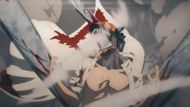Chainsaw Man has become one of the most distinctive and bold modern manga and anime series. Denji, the main character of this rough and yet emotionally touching story, is unlike most protagonists of shonen titles. Instead of a linear line of growth and success, Denji has frequently appeared to have stagnated, reiterating dysfunctional patterns and being oblivious to his potential. This narrative decision has attracted criticism and controversy, especially since it addresses the underlying messages of the series.
The stagnation in the development of Denji has a definite response: his trauma has not been resolved. The life of Denji has been characterized by loss, abuse, betrayal, and the constant fracturing of a few relationships he can form. The fact that he cannot develop from these past experiences is not a fault of storytelling but is rather a deliberate choice on the part of Tatsuki Fujimoto. Chainsaw Man does not show trauma as something that can be easily conquered, but rather as the cycle that puts a lot of pressure on the main character and prevents linear progress.

The broken personality of Denji was already preconditioned by his childhood. Being born into abject poverty, having to pay off his father's debt to the yakuza, and finding himself alone in dangerous circumstances with only Pochita to accompany him, Denji was never given a proper ground to build emotional sanity.
Even after turning into Chainsaw Man, his life has not improved in important aspects. Time and again, individuals take advantage of his innocence, exploit his love and longing to live a normal life, and leave him worse than ever. Such a cycle sends him hanging on to the thread of survival instead of developing as a character.

The other thing that can be taken into account is the fact that Chainsaw Man intentionally juxtaposes Denji with other characters who are more recognizably developing. Characters such as Aki or Power, despite being tragic at some stage, have experienced instances of transformation and acceptance, bringing them closure.
Denji, on the contrary, appears to be deprived of such moments. This does not imply that Fujimoto did not give him any growth; it just means that Denji represents the theme of a person who is trapped in the vicious cycle of suffering, where surviving takes the over progressing. It is a radical twist on the shonen formula in which tragedy is commonly transformed into power.
Denji’s Trauma in Chainsaw Man and Fujimoto’s Narrative Intent
The role of trauma in Chainsaw Man is even more evident when taking relationships of Denji into consideration. His relationships with Power, Makima, and Nayuta bring out his desire to have a family and love, yet all are tainted by loss or manipulation.
The death of power is particularly devastating, not only because it left him without his best friend but also because it marked the annihilation of the very thin thread of stability he had been holding onto. Rather than empowerment, Denji collapsed, and this reaction supports the idea of how trauma as a hostage keeps him in chains.
It is this stagnation that also defines the audience's perception of him. According to some fans, Denji is deemed annoying as he is neither mature nor does he learn not to make the same mistakes. That is the frustration that Fujimoto wants. Denji is a reflection of real human life, where trauma does not just go away, and the recovery is not a set of steps. Through depriving Denji of a classic heroic journey, Chainsaw Man highlights that trauma has a lasting possibility of impairing the power to change in their existence, despite the opportunities that are extended to them.

Meanwhile, the fact that Denji does not make any progress contributes to the bigger story of Chainsaw Man. It compares the harsh reality that he occupies with his hopeful but futile efforts to pursue one thing or another, such as romance, family dinners, or school. Every time he is on the edge of a potential breakthrough, something gets torn, and he is left behind in a worse condition. His losses are not documented in an attempt to render him unlikable, but to emphasize how institutional oppression defines and usually kills the potential for development.

The stagnant development of Denji in the Chainsaw Man manga is also an indicator of the author ridiculing the expectation of readers. Shonen storytelling usually requires a reader or a viewer to see a protagonist learning, getting stronger, and victorious at the end.
Fujimoto defies these conventions by refusing the Denji arc. Denji is not supposed to be a role model but rather a manifestation of the power of the trauma to confine people into loops of wrong choice, self-harm, and emotional numbness.
To sum up, the deficiency of character development in Chainsaw Man is not a case of accident on the part of Denji. The accumulating miseries of his existence, the early troubles, and the shattering defeats of latter courses prevent his maturing in the respects which audiences may desire.
Fujimoto has developed him in a way that he represents the bitter reality that trauma is not necessarily a kick starter but more of a chain that does not allow one to move ahead. Chainsaw Man puts a major emphasis on the cost of suffering through Denji, and it also revises the meaning of being a follower of a protagonist in a dark and unpredictable tale.
